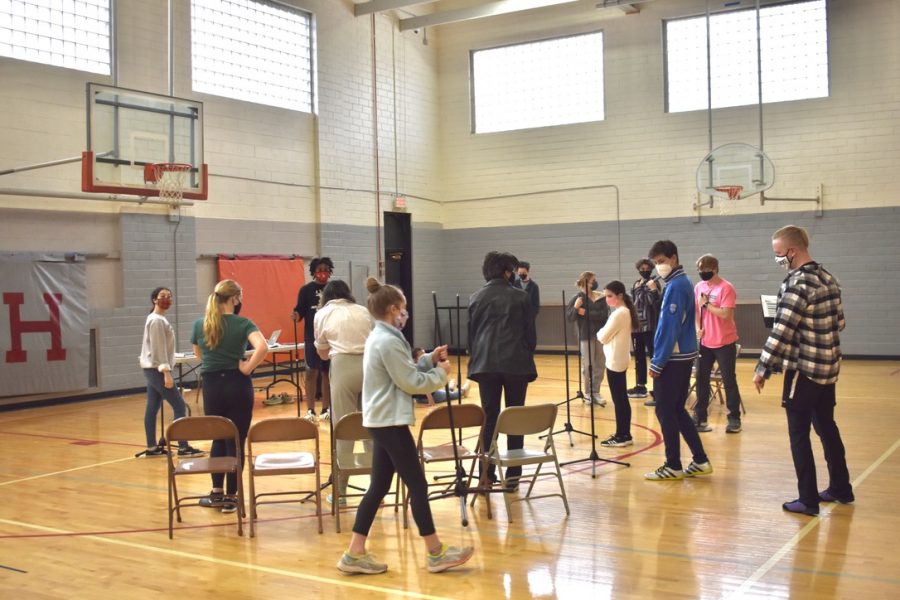Drama prepares for pre-filmed performance
Students rehearse for the spring musical, Working, in the North Gym. There are a total of 14 cast members in the production, which will be filmed over the course of two weeks.
The SHS drama department is in rehearsals for their first musical of the year, Working. Adapted from the original version in 2012, the show features music from various composers such as Lin Manuel Miranda and Stephan Schwartz.
“I think my favorite part of [the show] is the music. I think it has a really cool score, and it’s been a lot of fun to learn the music to the show,” said Leo Newman, junior and actor. “The music was written by a bunch of different composers, so there are different styles throughout the whole thing.”
The show is also unique because of its cast size — with a cast that can be as small as six people playing 26 different characters, there’s a lot of room to play with the size of the production. Shorewood’s cast consists of 14 actors.
“The size of the cast [in Working] can be as large or small as you want it to be,” said Dr. Adam Sheaffer, drama director. “We didn’t know how many people were going to audition, so we wanted it to be as flexible as possible.”
Working was an ideal choice for safety during the pandemic due to the flexible cast size, a small pit orchestra (only six musicians), and limited number of people onstage at a time.
I think it’s a really good musical for COVID times, because there’s usually not many people on stage at once.
— Daphne Shearburn, freshman
“I think it’s a really good musical for COVID times, because there’s usually not many people on stage at once,” said Daphne Shearburn, freshman. “It’s usually more focused scenes, instead of a lot of group numbers.”
The show’s flexibility has made it a popular choice during the pandemic. UWM put on the musical April 14-20 and Whitefish Bay High School performed it on April 16 and 25.
This production is the third from the SHS drama program this year, but the musical numbers and length set it apart from the shorter productions from the fall and winter.
“There’s a lot more energy behind this production [compared to others this year], and the scale of the production is gonna be a little bit bigger,” Sheaffer said.
COVID precautions have made rehearsals more challenging in multiple ways. Due to spacing requirements, the cast must rehearse in the North Gym instead of the studio theater. The final performance will utilize handheld microphones instead of the traditional body mics, and the performance will be filmed in short pieces instead of continuously to avoid quick changes that would require close contact. When singing, the actors must stay especially far apart and wear masks.
“It’s been harder to hear people and to learn our parts individually,” Shearburn said. “It’s harder to pick up on your part because you don’t get as close, especially since we’ve been rehearsing in the North Gym.”
Despite the challenges, rehearsals are running smoothly for the most part so far.
“[Rehearsals] are going a lot better than I thought they would, given the limitations,” Sheaffer said.
The ultimate goal is to film the production over the course of two weeks, rather than having live performances for an in-person audience. This presents unique challenges for many actors.
“Personally, I find that it’s really important to have a connection with the audience when you’re performing, and not having that is a real shame,” Newman said.
However, the cast is still working just as hard as they would in a normal year to produce a quality show.
“I don’t think it’s affected our work ethic or anything,” Shearburn said. “Everyone’s working super hard and everyone’s putting in a lot of effort.”
“[The leaders] are trying to hold us to the same standards as they would in the past, because that’s how you make a good show,” Newman said.
Though recording the musical instead of performing it live can be a negative, there are also potential benefits.
“I know you lose something from not being in the theatre, but you also reach a much larger audience,” Sheaffer said.
Sheaffer hopes the musical’s message resonates with audiences during the pandemic.
“The message of this show [is] the appreciation of all the work that’s done to build this beautiful world that we have… and during this pandemic, when work looks really different, work has become a real focus,” Sheaffer said. “I thought it was sort of appropriate and timely as well.”

